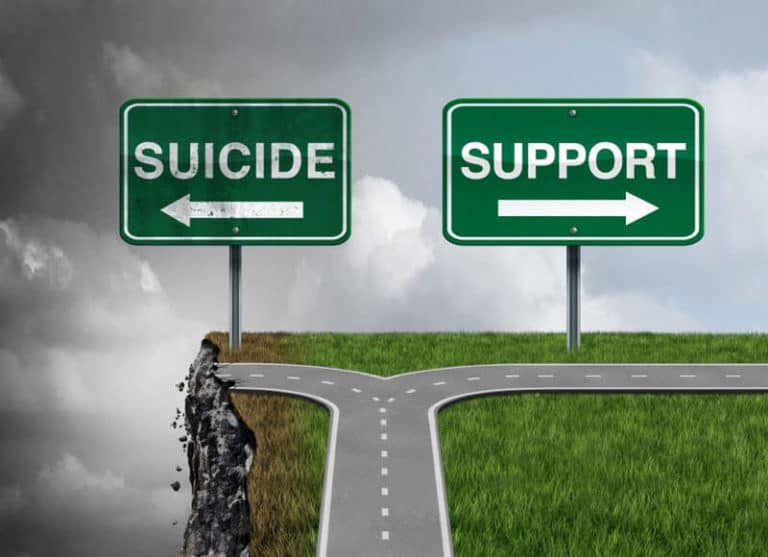Is there someone in your life whose mental health concerns you? A family member, colleague or friend? Do you want to help but do not know how? Maybe you do not know how to help someone struggling with anxiety or depression? What about if you know someone with a drug problem but you do not know how to broach the subject with them?
Most of us face this problem at some point in our lives. And it can cause a flood of emotions, questions and doubt. What if I am wrong? What if they do not want help? What if I am wrong and they are not trying to cope with a mental health issue?
Here we cover some signs that someone you care about may be struggling and ways to support them when they are trying to cope with mental illness.

Signs of a mental health problem
Only a professional can diagnose a mental health disorder but there are signs that can tip you off. But the specific problem does not really matter. What matters is to show sensitivity to a person who appears troubled rather than know if they have a diagnosis.
There are some symptoms to watch out for that can be signs of different common disorders. You need to remember that everyone reacts differently when they are not feeling well or are not coping. For example, if you are close to someone you may see changes in their moods or behaviour.
Here are some signs of the more common mental health disorders.
Symptoms of anxiety
Anxiety can be debilitating. Some of the signs to watch out for include:
- Psychological signs. Psychological signs include obsessive thinking, excessive worry or fear, catastrophising every little thing in their lives.
- Physical signs. Physical signs include restlessness, panic attacks, feeling tense and on edge, hot and cold flushes, tightness in the chest, breathing quickly, irritability, a lack of focus and a racing heart.
- Behavioural signs. Behavioural signs include avoiding situations that were once enjoyed and can have a negative impact on family, work, social and student life.
Symptoms of depression
Depression is insidious and can destroy someone’s life of they do not get help. Some of the signs to watch out for include:
- loss of enjoyment in life
- persistent sadness that lasts for more than two weeks
- increased anxiety
- loss of self-confidence
- feelings of hopelessness
- thoughts the world would be off without them
- changes in eating patterns
- skipping work
- changes in sleeping patterns
- lack of focus and productivity
- worried about being sick all the time
- drinking more alcohol than usual or taking drugs.

How you can help
When someone is trying to cope with a mental illness, they can feel alone. They may even try to hide how they feel for fear of the stigma of mental illness, and not wanting to burden family and friends. But this is a time where they need unconditional love and support from the people who matter most to them.
Here are some tips for supporting someone that may have a mental illness.
Offer support to seek professional help
Offer to support them in seeking professional help. Let them know you will go with them to the doctor or to see a counsellor. Or they may need help talking to their family or friends. Let them know you are there to support them when they need your support.

Understand the specific mental illness
Become informed about the specific mental illness the person faces if they have a diagnosis. Ignore the myths and go straight to the source for the truth. Look into what mental health specialists say and what it takes to recover. Even talk to people who are experiencing mental health issues or had similar experiences.
Start a conversation
Start a conversation. Set aside some time where there will be no distractions. Avoid a debate and being judgemental if they do not agree or do not admit there is a problem. Ask open ended questions like, “How are you feeling?” rather than talking to them about the symptoms you see. Let them talk as little or as much as they want to. Let them talk at their own pace without trying to second guess how they are feeling or diagnosing their symptoms.
Listen to find out why they are struggling with life at the moment. Avoid trying to change them or their mind. It is important to listen to build trust and a rapport. Show them you understand how they feel even if you do not agree with what they say. It lets them know you have respect for the way they feel. Offer to be there for them whenever they need to talk.
Ask how you can help
There is no point in guessing what will help someone. Ask them what they need. This may be difficult for the person dealing with mental illness to know. But asking them what they need shows that you do not know everything or what is best for them. This is empowering and can help them think about the help they need. And, when they do let you know how to help, see if their requests are possible. Do not make false promises. Be honest about what you can and cannot do.
Once they start talking keep the discussion going. Talk about wellbeing. How exercise, diet and taking time out can improve mental health. Discuss different ways to lower stress levels and ask if there is anything they would like to do.

Know your own limits
Know your own limits and ask for help when you need it. It can be tough supporting someone with mental health issues. Do not fall into the trap of being a saviour. It does not matter how much you care about or love someone, you cannot fix their problems. You need to look after your own health so you can help someone that matters to you.
Dealing with suicidal thoughts
When someone you are close to is in acute distress and talks about suicide or you suspect they are thinking of suicide, they need urgent help. Contact us on 1300 236 272 or Lifeline.
Ask them how you can help and that you are there for them. Talking and knowing someone cares can be a comfort for someone in this state. Offering them compassion, objectivity and acceptance can be valuable to someone feeling this way.
This can be distressing for you so you may also need counselling or support. I have qualified mental health professionals who can help someone dealing with mental health issues or who can help you support someone you care about. Download my free Hope program to help someone in need.

Get counselling
You may need counselling yourself when supporting someone with chronic mental health issues. It is incredibly tough and stressful helping someone deal with their mental health issues. You may need someone completely independent to discuss your feelings of frustration and hurt so you do not upset the person you are trying to help. Talking to my qualified mental health specialists will help you see with objectivity and give you better clarity to deal with your own emotions around a difficult situation. The healthier you are, the better equipped you are to deal with difficult situations.
Coping in a crisis
There are times where someone suffering with mental health issues may experience a crisis. They may break down in tears, feel suicidal, have a panic attack or experience an alternate reality. It is important to stay calm in these situations. You can cope in this type of situation by:
- listening to what they need in that moment in time
- reassuring that there is help
- encouraging them to seek professional help
- avoiding a confrontation
- asking what will help and if there is someone you can contact for them
- getting medical help if they have physically hurt themselves.
It can be difficult at times when you support someone with a mental illness. Avoid reinforcing or dismissing what they are experiencing, but do acknowledge how they feel. My qualified mental health professionals can help you too when supporting someone who needs help.

Get help
Contact us to find out how I can help you or someone you are close to deal with a mental health issue. Or if we can support you to take care of someone that relies on you for support. We can help with all types of mental health disorders. But, if you or someone you know is in a crisis, call us immediately. We can help lift suicidal thoughts quickly so you or someone you care about can deal with things better. Call us on 1300 236 272 when you need help.
We can work with you in our Spas, over the phone or via Skype wherever you are in the world. Book in today for my Emotional Empowerment Program. I have an introductory offer for just $79 so you can start taking back control of your life. We can help most people replace mental illness with peace, joy and happiness in a matter of weeks. And, we can support you helping someone else. Contact us today.
Let me help stop the effects of depression
My Emotional Empowerment Program has helped thousands of people like you control their mental health issues so they live happier lives. With my help you can learn to stop these crippling symptoms taking over your life without the use of prescribed medications. I can help you replace these feelings with happiness, peace and contentment in weeks not years. Have a listen to what Rebecca has to say about my program after a few sessions.

